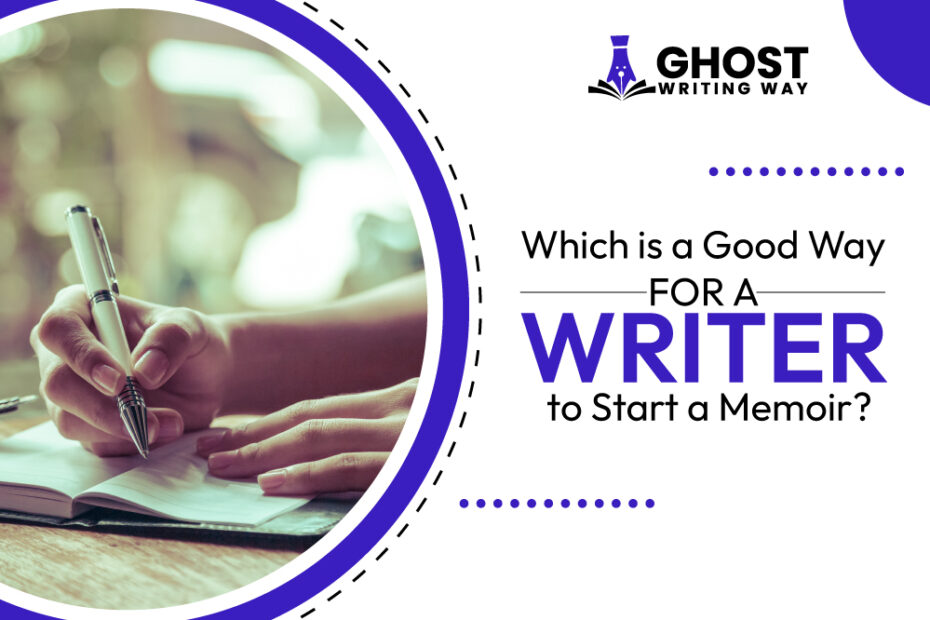Have you ever heard the phrase, ‘You are the hero of your own story?’ While that is true, the thing is that most people don’t get to share their stories. You might have an interesting story to share with the world, but you just don’t know how to do so. Now, you can either start a memoir yourself or seek assistance from a memoir writing service.
Writing a memoir is hard work; you have to look back at your life, which often involves revisiting hard memories. Once you have done that, you have to start writing. But how do you start a memoir? If you have the same question, then just read on ahead, and you’ll find the answer.
But first, let me explain what is a memoir.
Often confused with an autobiography, a memoir is a piece of non-fiction, narrative writing told from the point-of-view (POV) of the author. Unlike an autobiography, a memoir pinpoints a specific event in the author’s life and then attempts to recreate it with the help of storytelling.
How to Start a Memoir?

Even though you are writing a memoir, you need to have an idea of what you want it to be about. You need to finalize the overarching story before you start writing. Once you have your story, you will need a great opening.
Since a memoir is not an autobiography, it does not focus too much on facts or minute details and, hence, can be treated like any other story. Like in any other story, a memoir needs a good hook to grab the attention of the reader.
What is a hook? A hook is an opening statement or part of a story that attempts to grab the reader’s attention. This can be a dialogue, a philosophical question, a glimpse of an event that would happen in the future, etc. The hook should occur in the first few pages of the first chapter, if not in the very first paragraph.
But how do you do that? Here are a few ideas of how you can keep the reader engaged from the word go. Let’s look at the best ways you can start a memoir.
Make The Readers Curious

The old saying goes, “Curiosity killed a cat,” but in terms of writing, it can be said that “curiosity keeps a reader reading.”
Humans are creatures of curiosity; they like to pose questions and then find answers to them. They do not like anything that is unsolved, and the problem keeps knocking at them until they resolve it. You can pose questions to the readers at the beginning of the memoir; then, they will continue to read because of the need to unravel the mystery and get answers to the questions.
Liz Murray writes in her memoir, Breaking Night: A Memoir of Forgiveness, Survival, and My Journey From Homelessness to Harvard,
“The first time Daddy found out about me, it was from behind glass during a routine visit to prison, when Ma lifted her shirt, teary-eyed, exposing her pregnant belly for emphasis. My sister, Lisa, who was just over one year old, sat propped against Ma’s hip.”
In this opening, Murray leaves readers asking why was her father in prison? What would her mother do next? What was next for the family? These questions form instantly in the reader’s mind and make them curious about what will happen next and make them want to read further.
Make The Readers Laugh

“Laughter is the best medicine,” so try to open your memoir with a joke that will make the reader laugh. It might be a bit difficult as you might be writing about something dark, but even dark humor may work; just make sure that it goes with the theme of your story.
The thing is that if you are writing about something dark then it is better to start with a humorous statement and sprinkle humor in the entire memoir. Not having humor in a dark-themed memoir will emotionally drain the reader, and no one likes feeling down throughout the read. Readers want to feel a range of emotions which will make them want to continue reading.
For example, in “Seriously … I’m Kidding!” Ellen DeGeneres opens with the following:
“Over the last year or so since I decided to write this book, people have been asking me how I have the time and why I chose to write it. The truth is, last June, I was driving through a tunnel while on the phone with my agent, and my cell service was spotty. I said, ‘I just got a great IKEA table for my breakfast nook.’ My agent thought I said, ‘I’ve got a great idea for my newest book.’”
Emotional Opening

Even though you may have a great plot and an interesting story, it wouldn’t matter if there is no emotion in your memoir. Thankfully, this is a memoir, so it is a bit easier to evoke emotions out of the readers. Readers know that the events told are true, so this causes them to have raw emotions towards the author.
Now, as a memoir ghostwriter just has to decide the right place to write the emotional scene, and most of the time, the best place is the opening. Even if it’s just a glimpse, you can elaborate on it later, but putting it at the opening hooks the reader instantly.
For example, in her memoir, “Between Breaths. A Memoir of Panic and Addiction,” Elizabeth Vargas starts off by saying:
“I don’t know if I was born an alcoholic, but I was definitely born anxious. The alcoholism came to me later in life, after years of drinking to ease stress and worry and to fend off panic.”
Start a Memoir – Final Thoughts
There are many different ways you can start a memoir; above are just three ways to do so. However, there is a common thread between them, and that is to make the readers feel. When you make a reader feel something – happy, curious, sad, worried, etc. – then they will keep on turning the pages.
One important thing to remember is to treat your memoir like a story or a novel. As mentioned at the start, a memoir is different from an autobiography. This gives a memoir some leeway when it comes to following the rules and guidelines. It is not important to give all the facts in a memoir, just those that concern the main story.
To ensure this, a memoir should have an overarching story, and this story should have a beginning, middle, and end. You can make use of story elements like dialogue, side characters, etc., to your advantage. Use them to enhance your memoir and tell an engaging story. Sometimes, openings may come to you, like a phrase or a scene, but other times, you may need to sit down and work on it. It is hard work, but ultimately, it will be beneficial for your memoir. Hopefully, the above pointers helped. Just remember that the main goal is to get the reader to keep turning pages.




